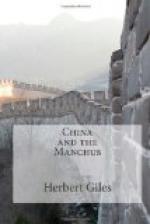In 1874 the Japanese appear on the scene, adding fresh troubles to those with which the Manchus were already encompassed. Some sailors from the Loo-choo Islands, over which Japanese sovereignty had been successfully maintained, were murdered by the savages on the east coast of Formosa; and failing to obtain redress, Japan sent a punitive expedition to the island, and began operations on her own account, but withdrew on promises of amendment and payment of all expenses incurred.
CHAPTER X—KUANG HSUe
In 1875 the Emperor T`ung Chih died of smallpox, and with his death the malign influence of his mother comes more freely into play. The young Empress was about to become a mother; and had she borne a son, her position as mother of the baby Emperor would have been of paramount importance, while the grandmother, the older Empress Dowager, would have been relegated to a subordinate status. Consequently,—it may now be said, having regard to subsequent happenings,—the death of the Empress followed that of her husband at an indecently short interval, for no particular reason of health; and the old Empress Dowager became supreme. In order to ensure her supremacy, she had previously, on the very day of the Emperor’s death, caused the succession to be allotted, in utter violation of established custom, to a first cousin, making him heir to the Emperor Hsien Feng, instead of naming one of a lower generation who, as heir to T`ung Chih, would have been qualified to sacrifice to the spirit of his adopted father. Thus, the late Emperor was left without a son, and his spirit without a ministrant at ancestral worship, the only consolation being that when a son should be born to the new Emperor (aged four), that child was to become son by adoption to his late Majesty, T`ung Chih. Remonstrances, even from Manchus, were soon heard on all sides; but to these the Empress Dowager paid no attention until four years afterwards (1879), on the occasion of the deferred funeral of the late Emperor, when a censor, named Wu K`o-tu, committed suicide at the mausoleum, leaving behind him a memorial in which he strongly condemned the action of the two Empresses Dowager, still regarded officially as joint regents, and called for a re-arrangement of the succession, under which the late Emperor would be duly provided with an heir. Nothing, however, came of this sacrifice, except promises, until 1900. A son of Prince Tuan, within a few months to espouse the Boxer cause, was then made heir to his late Majesty, as required; but at the beginning of 1901, this appointment was cancelled and the spirit of the Emperor T`ung Chih was left once more unprovided for in the ancestral temple. The first cousin in question, who reigned as Kuang Hsue (= brilliant succession), was not even the next heir in his own generation; but he was a child of four, and that suited the plans of the Empress Dowager, who, having appointed herself Regent, now entered openly upon the career for which she will be remembered in history. What she would have done if the Empress had escaped and given birth to a son, can only be a matter of conjecture.




